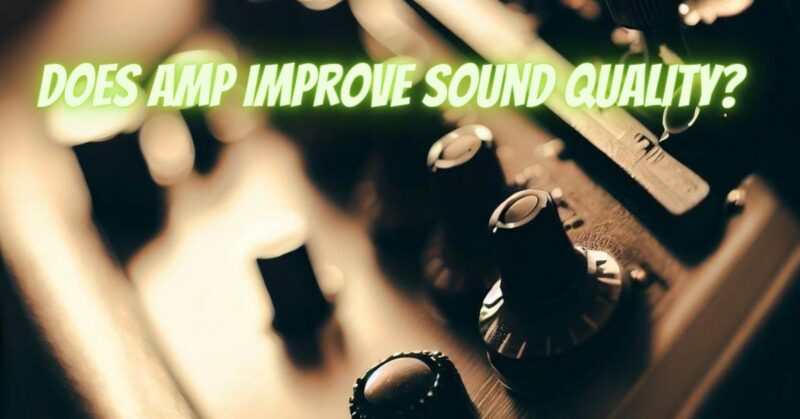In the realm of music, the pursuit of impeccable sound quality is a driving force for musicians and audio enthusiasts alike. Amplifiers stand as one of the key elements in achieving this goal. The question arises: Does an amplifier truly improve sound quality? This article delves into the intricate relationship between amplifiers and sound quality, uncovering how these devices elevate the sonic experience to new heights.
The Amplifier’s Role: More than Volume Boost
At its core, an amplifier takes a low-level audio signal from a source and increases its power level, making it suitable for driving speakers. While this enhanced power results in increased volume, the amplifier’s impact on sound quality extends beyond sheer loudness.
Tonal Shaping: The Art of Refinement
Amplifiers are equipped with a variety of controls and components that influence sound quality:
- Equalization (EQ) Controls: Amplifiers often feature EQ knobs that allow users to adjust the balance of bass, midrange, and treble frequencies. This fine-tuning capability enables sound engineers and musicians to tailor the tonal balance according to their preferences and the context of the performance.
- Clarity and Definition: A high-quality amplifier can provide cleaner amplification, minimizing distortion and noise. This results in improved clarity and definition across the frequency spectrum, ensuring that each element of the sound is faithfully reproduced.
- Dynamic Range: Amplifiers with ample headroom offer a broader dynamic range. This means that they can faithfully reproduce both the quietest and loudest parts of the music without compression or distortion, preserving the nuances of the original performance.
Amplifier Types and Sound Quality
Different amplifier types wield varying effects on sound quality:
- Tube Amplifiers: Tube amps are celebrated for their warm, harmonically rich sound. The natural compression of tubes adds depth and character to the music, enhancing sound quality with a touch of vintage allure.
- Solid-State Amplifiers: Solid-state amps provide clean, accurate amplification. They are prized for their precision and reliability, offering a sound quality that is true to the source.
- Digital Modeling Amplifiers: These amps simulate the characteristics of various amplifier types, allowing users to access a range of tonal possibilities. While some purists might debate their authenticity, high-quality digital modeling amps can provide excellent sound quality and versatility.
Beyond Volume: Sound Enrichment
An amplifier’s ability to improve sound quality extends to its role in sound enrichment:
- Effects Integration: Many amplifiers come equipped with built-in effects such as reverb, chorus, and delay. These effects contribute to a more immersive sonic experience, adding dimension and texture to the sound.
- Speaker Interaction: The choice of speaker and cabinet significantly influences sound quality. Amplifiers designed to work seamlessly with specific speaker configurations can optimize the sonic outcome, enhancing sound quality even further.
In the pursuit of sonic excellence, amplifiers play a vital role in enhancing sound quality. While they undoubtedly contribute to increased volume, their impact goes beyond sheer loudness. Through tonal shaping, improved clarity, dynamic range, and effects integration, amplifiers elevate the sonic experience to new heights. The choice of amplifier type—tube, solid-state, or digital modeling—further allows musicians and sound engineers to tailor their sound quality according to their artistic vision and preferences. Ultimately, an amplifier is not just a tool for amplification; it is a vehicle for artistic expression that transforms sound into a journey of emotion and inspiration.


